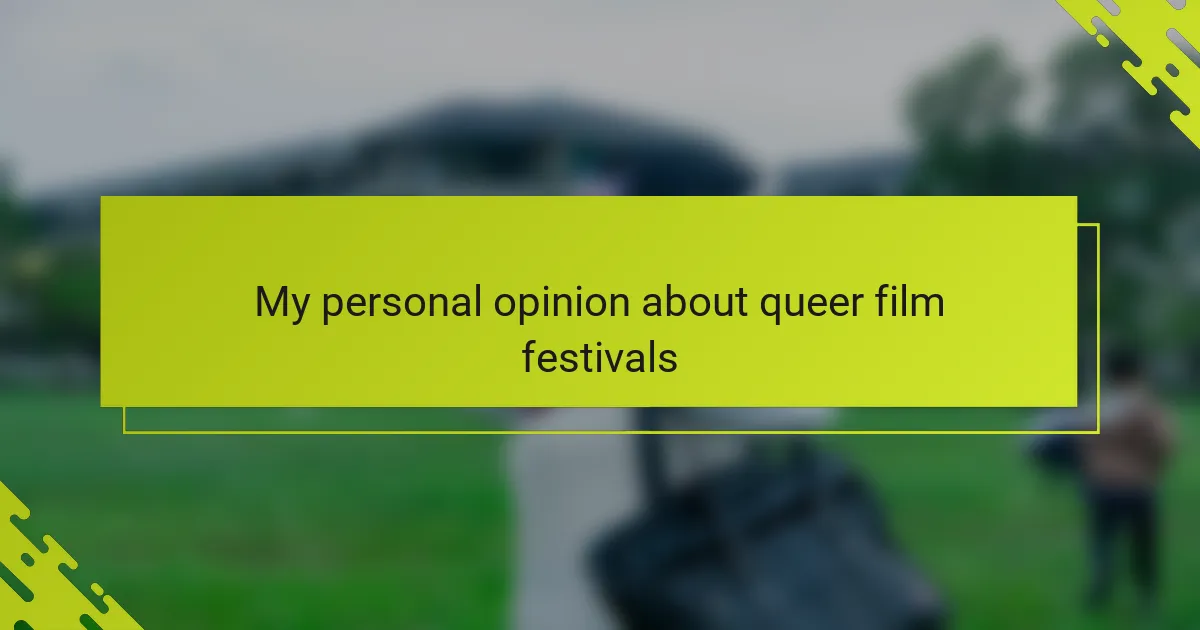Key takeaways
- Queer women culture fosters community and connection, celebrating diverse identities and experiences.
- Film festivals serve as platforms for visibility and activism, creating spaces for authentic storytelling beyond mainstream narratives.
- Attendance at these festivals can lead to meaningful connections and discussions that enhance the overall experience.
- Engaging with queer film festivals involves an open mindset and active participation in post-screening conversations to enrich understanding.
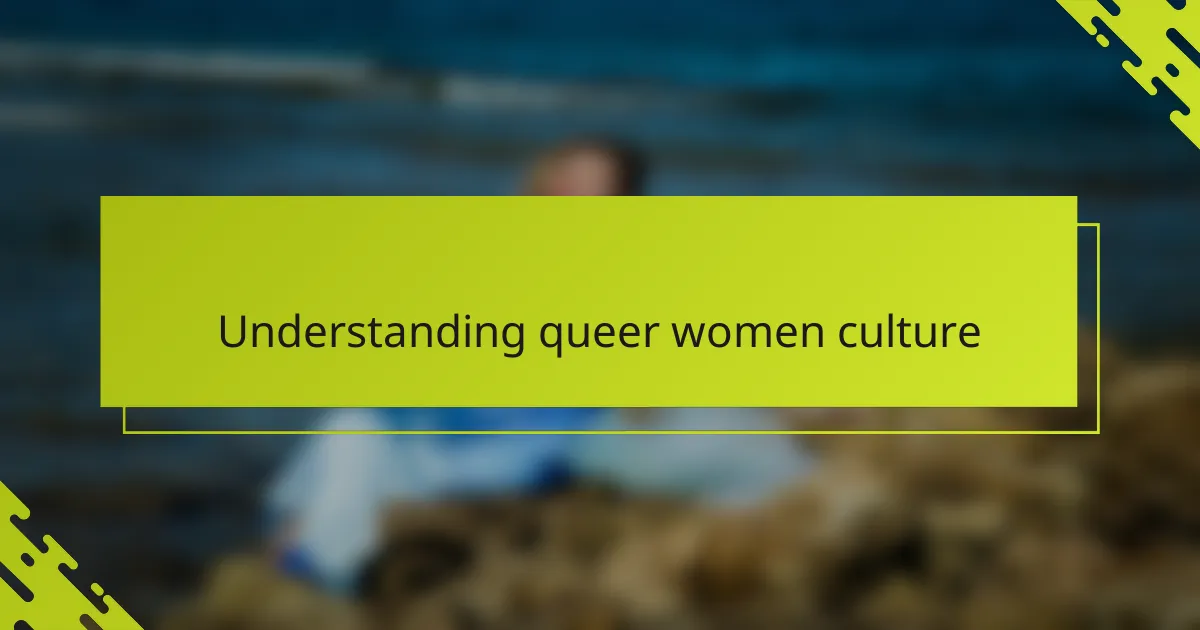
Understanding Queer Women Culture
Queer women culture is a vibrant tapestry woven from diverse identities, experiences, and expressions. It’s not just about sexuality or gender; it’s about community, connection, and finding a space where authenticity thrives. Have you ever noticed how this culture creates a unique sense of belonging that feels both freeing and grounding at the same time?
From my experience, queer women culture often challenges mainstream narratives and celebrates what has long been marginalized. There’s a powerful energy in shared stories, whether whispered in intimate gatherings or shouted from festival stages. It makes me wonder—how often do we pause to appreciate the subtle ways this culture nurtures resilience and creativity?
Understanding queer women culture means embracing complexity. It’s about recognizing fluid identities and resisting rigid labels, yet finding unity in diversity. This balance can be both confusing and exhilarating, but it’s precisely what makes the culture so dynamic and deeply human to me.
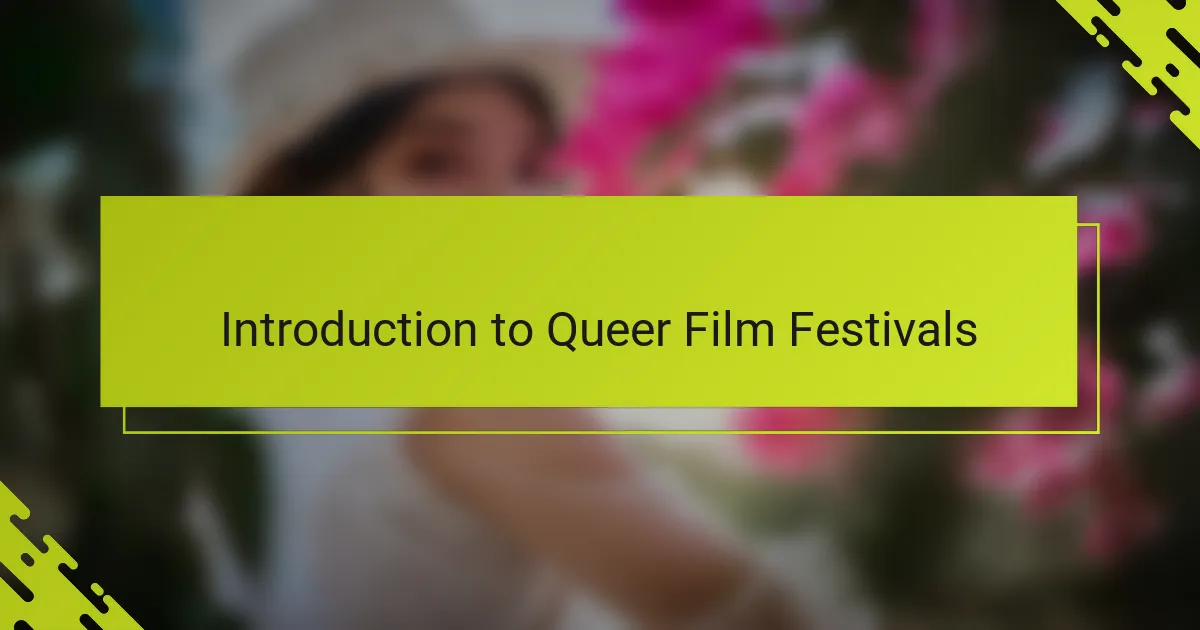
Introduction to Queer Film Festivals
Queer film festivals feel like a homecoming to me—a space where stories I rarely see on screen come alive with boldness and nuance. Have you ever found yourself watching a film where every character’s experience resonates so deeply that it shifts how you understand your own identity? That’s the magic these festivals hold.
Attending these festivals, I’ve noticed an electric mix of celebration and activism in the air. It’s not just about watching movies; it’s about witnessing voices that defy stereotypes and reclaim narratives, often in ways that mainstream cinema overlooks. This feels like a collective heartbeat—a reminder that our stories matter.
What fascinates me most is how queer film festivals create community beyond the screen. They invite us to connect, question, and grow alongside others who share our experiences and struggles. In those moments, I often feel both seen and inspired, making the space feel like a vital thread in the fabric of queer women culture.
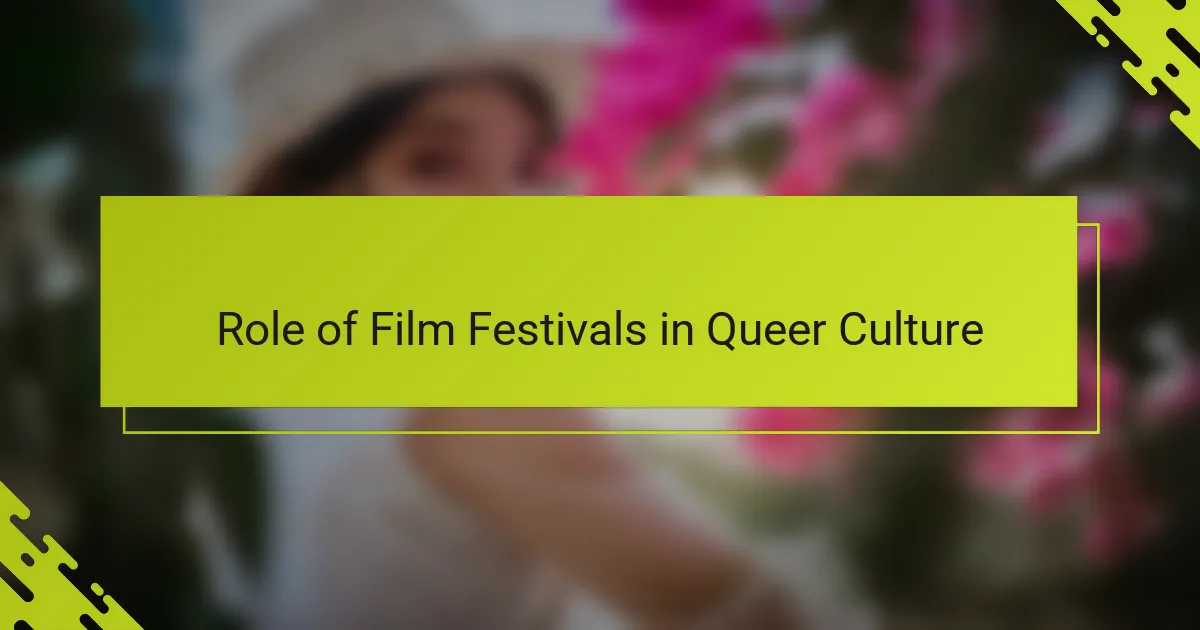
Role of Film Festivals in Queer Culture
Film festivals in queer culture act like powerful catalysts for visibility and validation. When I attend these events, I sense a deep collective affirmation—everyone there understands why seeing ourselves reflected on screen matters so profoundly. Isn’t it incredible how a single film can open doors to empathy and understanding that might otherwise stay shut?
These festivals also serve as gathering points where art meets activism. From my perspective, they’re not just passive showcases but vibrant forums where stories challenge societal norms and inspire real-world change. I often find myself energized by the conversations sparked in festival lobbies or after-parties, where ideas about identity and community bloom organically.
Moreover, queer film festivals carve out safe spaces for experimentation and expression that mainstream platforms frequently neglect. I’ve witnessed filmmakers take bold creative risks because they know their audiences will embrace authenticity over convention. Doesn’t that freedom to explore and be seen make these festivals feel like essential lifelines within queer culture?
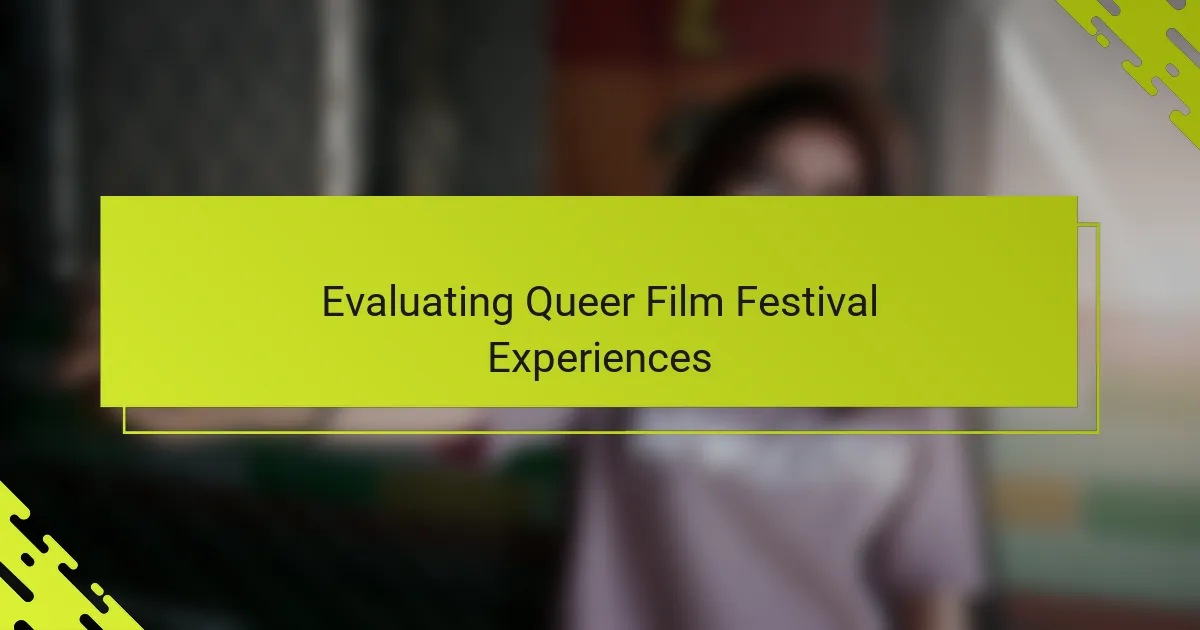
Evaluating Queer Film Festival Experiences
Evaluating queer film festival experiences, I often find myself reflecting on how these events balance entertainment with emotional depth. Have you ever left a screening feeling simultaneously uplifted and challenged, as if the film peeled back layers of both the story and your own perceptions? That lingering impact, for me, is the true measure of a festival’s success.
Sometimes, the most memorable moments aren’t just about the films themselves but the connections forged in those shared spaces. I recall a particular festival where a spontaneous discussion about representation sparked by a short film led to new friendships and ongoing conversations. It made me realize that these experiences extend far beyond the cinema seats.
Of course, not every festival hits all the marks. I’ve encountered events where programming felt uneven or the atmosphere less inclusive than promised, which made me question—how crucial is curation and community vibe in shaping an authentic queer film festival? From my view, attention to these details transforms a gathering into a truly affirming cultural space.
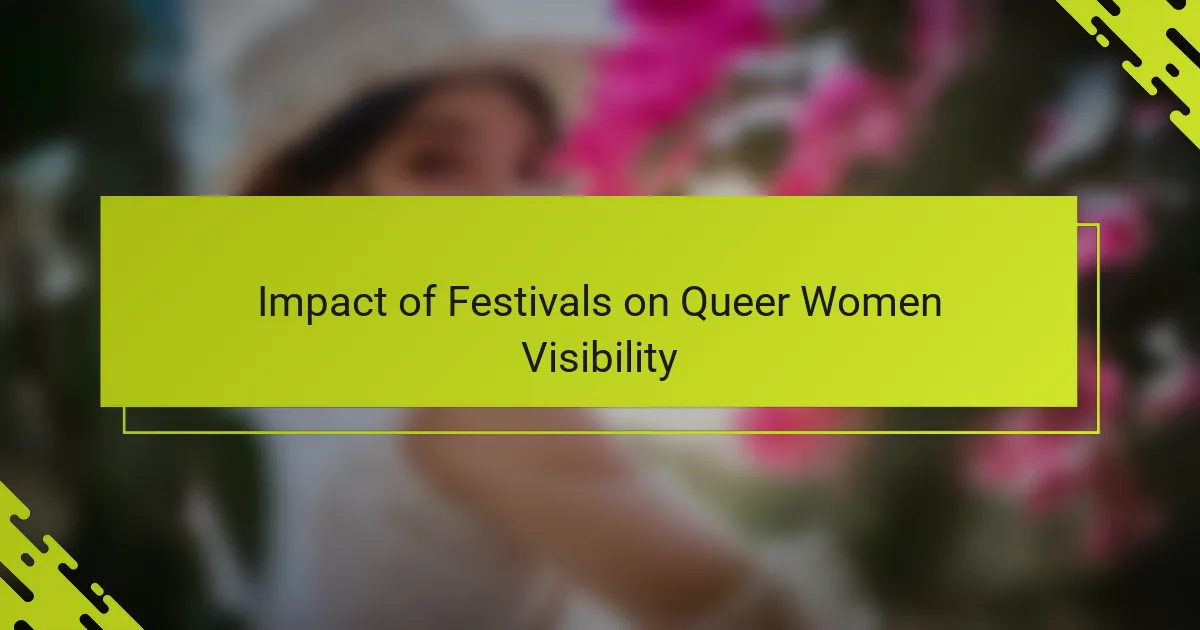
Impact of Festivals on Queer Women Visibility
Visibility for queer women at film festivals isn’t just about being seen on screen—it’s about feeling recognized in a space that often erases our stories. I remember attending a festival where a film centered on the nuanced experiences of queer women; the room held a quiet reverence, as if we collectively acknowledged how rare that representation still is. Doesn’t it feel empowering when your identity is reflected with complexity and care?
These festivals amplify voices that mainstream media tends to sideline, creating ripples of visibility that extend far beyond the event itself. From my perspective, this amplification helps challenge stereotypes and reshapes public perception, making queer women’s lives more visible in everyday conversations. Have you noticed how seeing diverse stories can spark empathy and curiosity in audiences who might not otherwise engage with queer women’s experiences?
Moreover, the visibility forged by these festivals feels deeply personal—it validates lived realities that often exist on the margins. I’ve witnessed how shared visibility at screenings and panels can foster a sense of belonging, reducing isolation and inspiring confidence. How powerful is it to be part of a community that sees you, hears you, and celebrates you in such an intentional way?
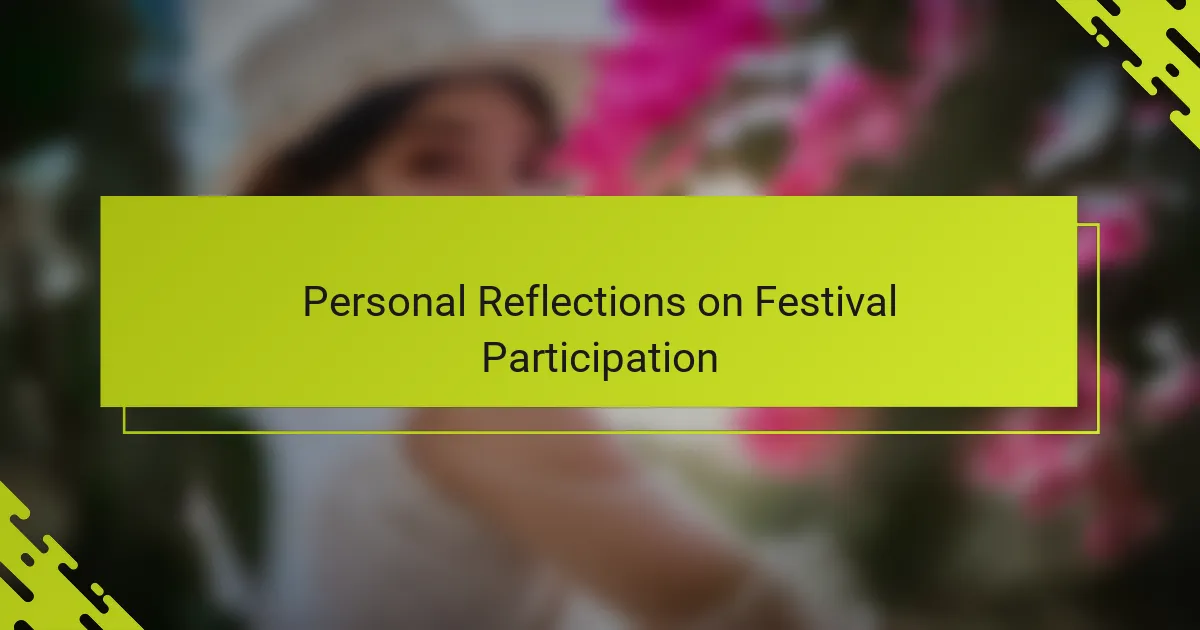
Personal Reflections on Festival Participation
When I first participated in a queer film festival, I was struck by how immersive the experience was—it wasn’t just the films, but the atmosphere of genuine warmth and acceptance that surrounded me. Have you ever noticed how being in a room full of people who truly understand and celebrate your story can shift your sense of belonging? That feeling stayed with me long after the festival ended.
One moment that stands out is when I joined a post-screening discussion that went beyond the film’s plot into personal storytelling and community struggles. It was in that circle of voices that I realized how these festivals foster connections unlike any other. It made me think: isn’t the power of coming together just as important as the art itself?
Of course, not every festival experience is seamless—sometimes logistical hiccups or programming choices can dampen the vibe. Yet, even in those moments, I’ve found value in reflecting on what makes a festival feel truly inclusive and authentic. From my viewpoint, those challenges highlight how crucial it is to cultivate spaces that not only show queer stories but nurture queer hearts.
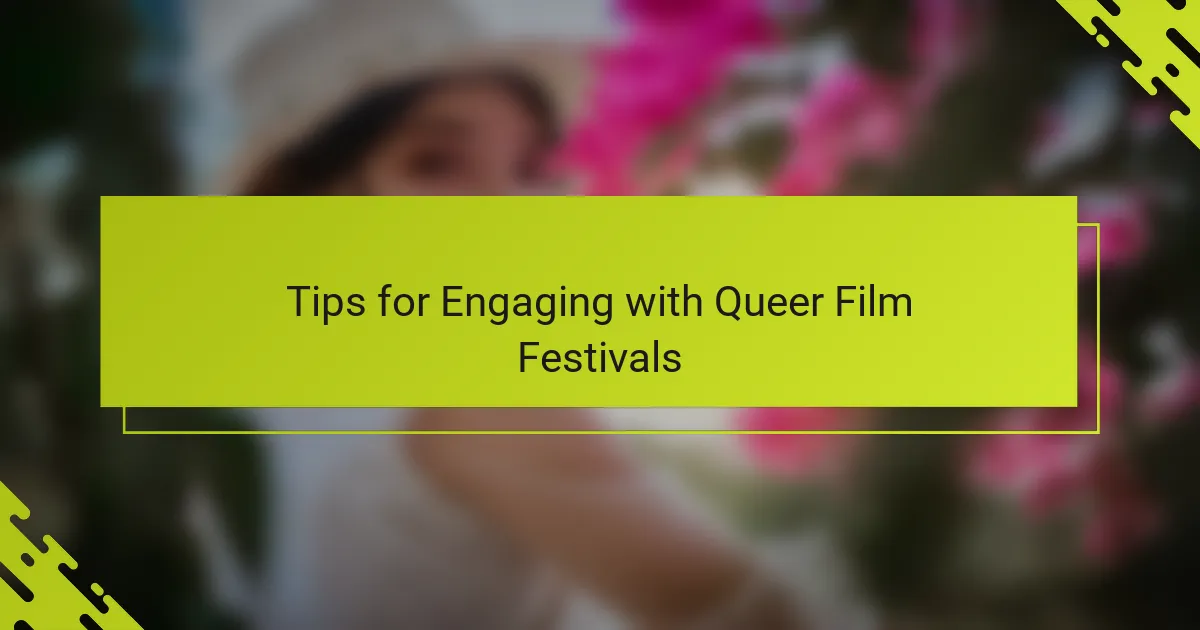
Tips for Engaging with Queer Film Festivals
One tip I’ve found essential is to approach queer film festivals with an open heart and mind. I remember walking into my first festival feeling a bit unsure, but allowing myself to truly listen and observe led to moments of unexpected connection and insight. Have you ever noticed how a genuine openness can turn even a simple screening into a meaningful experience?
Another strategy that’s helped me engage deeply is participating in the conversations after screenings. Sometimes, those discussions reveal layers of the film I hadn’t caught on my own and foster a sense of community that feels just as important as the films themselves. It makes me wonder—what stories might we miss if we only watch silently?
Finally, I recommend exploring beyond the mainstream selections and seeking out lesser-known or emerging filmmakers featured in these festivals. Supporting fresh voices not only enriches my own understanding but also contributes to sustaining diverse queer narratives. Have you tried stepping off the beaten path at a festival and discovering a hidden gem? That surprise can be one of the most rewarding parts.
